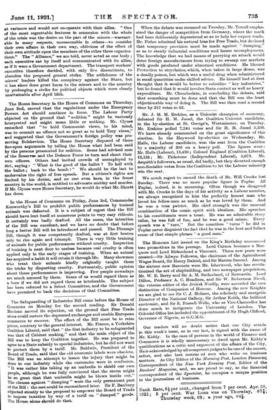The Safeguarding of Industries Bill came before the House of
Commons on Monday for the second reading. Sir Donald Maclean moved its rejection, on the ground that Free Trade alone could restore the depressed exchanges and enable European commerce to recover. The effect of the Bill must be to raise prices, contrary to the general interest. Mr. France, a Yorkshire Coalition Liberal, said that " the first industry to be safeguarded was that of Cabinet making," and that the main object of the Bill was to keep the Coalition together. He was prepared to agree to a State subsidy to special industries, but he did not want to protect them by a tariff. Mr. Baldwin, President of the Board of Trade, said that the old economic labels were obsolete. The Bill was an attempt to lessen the injury that might be done to our industry while the currencies were in confusion.
It was rather like taking up an umbrella to shield our own people, although he was fully convinced that the storm might be so great that that umbrella might be blown inside out." The clauses against " dumping " were the only permanent part of the Bill : the rest could be reconsidered later. Sir F. Banbury objected stoutly to the proposal to empower the Board of Trade to impose taxation by way of a tariff on " dumped " good*. The House alone should do that.


































 Previous page
Previous page